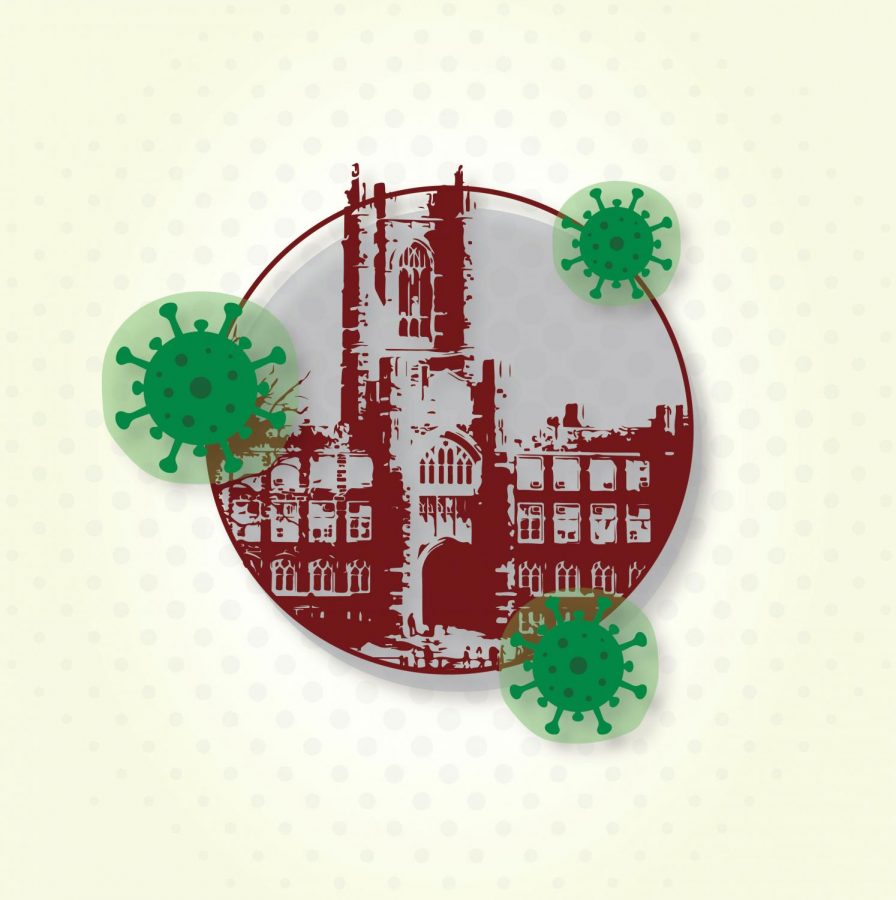Fall Semester is a Cautious Success for Fordham
Just a few months ago, the fall 2020 semester confronted Fordham University with a plethora of challenges. Many students feared returning to campus among all the unknowns. It was an unprecedented time for students, faculty and staff, and there were no procedures in place for how to manage a university in the midst of a pandemic. However, now that we are speedily approaching the end of the semester, we can now look back and analyze how well Fordham did while faced with the COVID-19 pandemic.
Fordham did a shockingly, undeniably good job of handling the virus. Was it a flawless job? No, of course not. There were some hiccups along the way, and the COVID-19 dashboard displayed some worrying spikes right before students went home for break; however, Fordham has handled the pandemic well overall, especially in comparison to other sizable universities in the state.
Fordham followed a modified calendar for the academic year in which students would stay home and finish the semester online instead of returning to campus after Thanksgiving break. This move attempted to prevent students from bringing the virus back to campus after going home for the holidays. Most other universities instituted similar modifications to their academic calendars as well.
The best policy the university put into place was definitely its mandatory testing rounds. Fordham’s testing procedures in general were quite impressive. The pop-up tent near O’Hare provided students with easy access to free COVID-19 tests. Results rolled in quickly, allowing students to immediately quarantine or isolate if needed. The testing center regularly welcomed walk-ins, allowing students and staff to get tested if they came into contact with any colleagues who tested positive for COVID-19, if they experienced symptoms or even if they simply wanted to make sure they were virus-free. Fordham made it extremely easy to get tested, which is one of the most important steps when it comes to preventing the spread of the virus.
After the initial testing required before the start of the semester, Fordham later announced requirements for two additional tests for all students, faculty and staff on campus. However, this is an area in which the university could improve. Although the mandatory testing rounds were great, they needed to be more frequent. Every three weeks is frankly not often enough — a lot can happen in three weeks that would go undetected without adequate testing. In the spring semester, Fordham should consider increasing testing frequency. There are obviously barriers to this, such as the expenses that come with the COVID-19 tests themselves and the need to keep the testing center staffed, but it would certainly be a worthwhile investment to keep the community safer overall.
The university has also used technology to its advantage, creating the COVID-19 dashboard which is available at all times on the school’s website. The dashboard displays all positive COVID-19 tests reported to the New York City Department of Health by the university and includes the average infection rate for the university over a 14-day period. Since 100 positive cases in a 14-day period would lead to a university shutdown per New York State guidelines, the dashboard helps students and staff keep track of how Fordham is doing.
Positivity rates remained well below 1% for much of the semester — a feat that proved impressive compared to many other New York schools like LIU Post or Binghamton University, both of which experienced shutdowns throughout the fall. Fordham’s positivity rates did rise above 1% recently, which can be attributed to the final round of mandatory testing or to students and staff simply becoming more laid back toward the end of the semester. That’s why remaining mindful of the virus is such an important aspect of preventing its spread.
Daily VitalCheck screenings enforced by the university required students and staff to remain mindful of whether they were experiencing any COVID-19 symptoms before entering campus each day. Fordham Forward’s Five Things also helped community members remain wary of the virus, instead of letting their guard down. These weekly emails gave students five important COVID-19-related things to focus on, simultaneously keeping students informed without overwhelming them with an overload of information.
The university, of course, also put into place the classic COVID-19 precautions that we have all unfortunately become accustomed to, such as social distancing guidelines, mandatory face coverings and quarantines for those students who return to campus from restricted states. The university restricted indoor dining at most on-campus dining locations, providing outdoor seating with tents. Later on, indoor dining was allowed at the main dining hall, where temperatures were taken upon entry and contact information was left for contact tracing. Masks are also required everywhere on campus, excluding in one’s own dorm room. There are also plenty of hand sanitizer dispensers located all across the campus.
Really, the university’s only downfall comes from its lack of ability to regulate the behavior of off-campus students. As the university stated again and again, the majority of positive COVID-19 tests came from students living off campus. This could be due to partying or other irresponsible actions, like walking around without a mask or ignoring social distancing recommendations. However, there is only so much Fordham can do to control off-campus students. Besides keeping students informed and warning them of the risks at hand, the university is out of options when it comes to enforcing these COVID-19 guidelines among off-campus students.
Overall, Fordham did a surprisingly good job at handling the virus. For the most part, cases were kept to a minimum. While more frequent mandatory tests would be a nice addition to the spring semester, it is up to the students and staff themselves to keep the risk at bay by following these mindful regulations in their everyday lives.
Taylor Herzlich, FCRH ’23, is a journalism major from Mt. Sinai, N.Y.

Taylor Herzlich is a senior at Fordham College at Rose Hill. She is majoring in journalism with a minor in English. Taylor started writing for the Ram...










































































































































































































